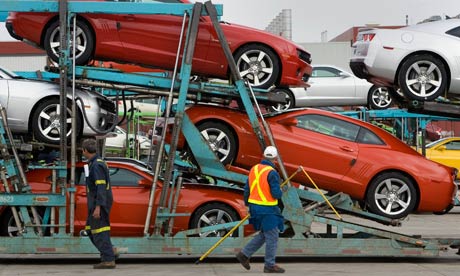
The return of General Motors to the US stock market tomorrow, 16 months after a $50bn government bailout, is likely to be the largest global public offering in US corporate history.
GM, which is anticipating significant Asian sovereign wealth fund participation, said today it was increasing the offer by 30% to 478m shares to meet demand. The sale, which will reduce US taxpayers' stake in "Government Motors" to below 35%, is expected to raise as much as $23bn (£14bn) at the offer price of $33 a share.
While the government has turned a profit on stakes it took in financial firms during the 2008 crisis, the cost of GM's bailout may never be fully recouped.
Investor demand for the offering represents a remarkable turnaround for the company. Last week GM announced it is on track for its first profitable year since 2004. Through a deal with the Chinese carmaker SAIC, GM now sells more cars in China than in the US. In advance of the IPO, GM executives have actively courted Asian sovereign fund investment.
But the sale has heightened political sensitivities regarding the transfer of US government assets to Asian and Middle Eastern sovereign funds. If GM shares surge, the government will also face criticism for undervaluing its stake.
Nevertheless, GM's offering confirms that the Detroit car firm is entering a post-bailout era while others, such as AIG and the mortgage company Fannie Mae and Freddie Mac, show little or no prospect of returning their bailout stakes.
Some economists warn that success sets the stage for future bailouts and creates potential moral dilemmas.
"If you can do this for one of the largest companies in the US, what happens when the next big crisis approaches?" Hirotaka Takeuchi, a professor at Harvard Business School, told the New York Times. "It may send the wrong signal to the rest of the world."

